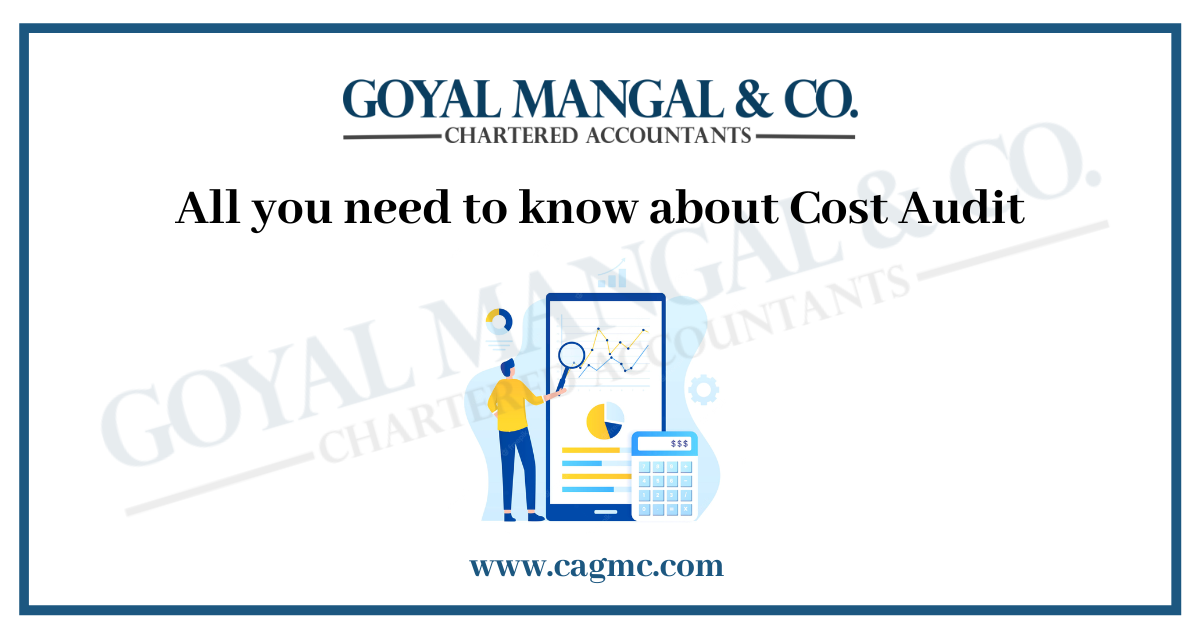
Cost audit is cost verification of accounting for the accuracy of cost accounting records. It is a way of ensuring that accounting records are in line with cost principles, plans, procedures, and purpose. Cost audit usually involves- Ensuring that the cost records are accurate, finding errors in the cost records, and checking if the cost of books, accounts, and records are properly maintained. This article provides all you need to know about cost audit.
|
Table of Contents |
Who conducts cost audit and require to keep a cost record?
Section 148 of the Companies Act, 2013 sets out the provisions and requirements relating to Records of cost and the use of cost audits.
The Companies Act (Cost Records and Audit) Rules of 2014 identify companies that are required to keep Cash Records, cost audit, and submit an Audit Report, in two separate categories.
However, companies covered by the above rules are free to conduct cost record audits in the event of any of the following situations:
- The revenue of an export company exceeds 75% of the total revenue
- A company operating in Special Economic Zone (SEZ)
- The company works with power generation through Captive Generating Plant.
Main objectives of cost audit
- To set accurate cost data without error.
- Ensure that costing principles are strictly adhered to.
- Assessing fraudulent activities and misconduct.
- It helps the company make informed decisions on important issues.
- It helps to determine the actual cost of a product or service when you are ready to sell.
- Reduces the burden of the external auditor by avoiding detailed audits.
- Monitoring that all aspects of the cost audit are withheld.
- Timely implementation of cost strategies.
- An assessment of the strengths and weaknesses of the cost department in the company.
- Reduce unwanted costs incurred by the company during production.
Importance of cost audit
It examines every minute detail of the costs incurred by the company while producing goods or services. The main objectives of a cost audit are:
- Identifying non-productive costs – Helps to separate costs whether they are productive or non-productive, where the firm can reduce non-productive costs that can increase profits.
- Strategic design and implementation – With a cost audit, the company can look at cost changes and can devise new strategies and strategies to meet rising costs, and the firm can make changes in advance in plans.
- Preparing budget planning – Cost audit reports from previous years may help his company in the future budget, as previous cost audit reports will provide strong information about changes in trends and cost variations etc. an important guide to budgeting.
- Helps to reduce direct or indirect costs – Additional costs include insurance, repairs, administration costs, hiring, etc. can be reduced by cost testing if required.
- Product price – Based on the cost audit report the company can adjust the price of the asset, to earn enough profit.
What if you do not do a cost audit?
Suppose we have a car manufacturing company in the UAE, and the company is facing a financial crisis due to rising production costs, and we find it difficult to manage finances properly, so there is a need to run a cost audit to determine the reasons for the lack of funding or increase in costs. Although neglecting to do cost audits means that your company will be in big financial trouble because finance is a business life and one has to use it efficiently and effectively. So by doing a cost audit you can identify the categories where the money is mostly spent and the areas where the money is wasted.
With cost audit, we can cut back on those lucrative expenditures. The firm can also bring about changes in the strategies it uses in the production of goods and services, such as it can reduce the number of workers if it depends on human labor, or it can stop the production of those unwanted goods and incur significant costs. It may also be useful during the external audit, the company may not face any problem in presenting cost records and statements, as the accuracy of those records is verified in advance during the audit and the company may not have to pay any kind of penalties in the future.
Cost Auditor qualifications
The auditor’s qualifications are as follows:
- Any person who is an accountant for operating expenses, in terms of the Cost and Works Accountants Act
- Any person who is a charted accountant, in terms of the Charted Accountants Act
- Member of the Institute of Chartered Accountants
- A person with 10 years of standing experience.
Final words
The scope of audit has grown exponentially in recent times. The parameters of the audit include not only financial audits, performance audits, and management audits, but also cost audits within them.
The Government of India has also introduced Cost Audit by Cost Accountants for the benefit of the public by an amendment under Section 233 (B) of the Indian Companies Act, 1956. It authorizes the central government to direct the audit of expense accounts of a company involved in production, processing, manufacturing, and mining operations.
The scope of the cost audit will depend on the terms of reference as may be specified by management, for example, an in-depth analysis of the current accounting system or an evaluation of the adequacy of a return to normalcy.


